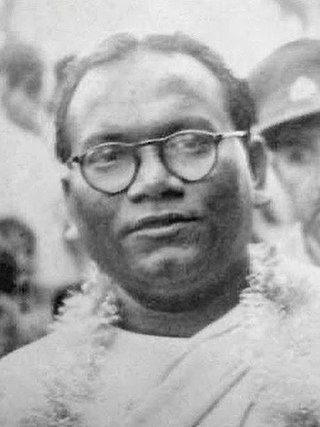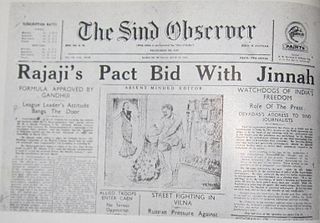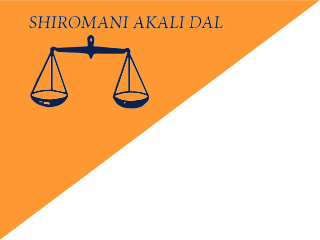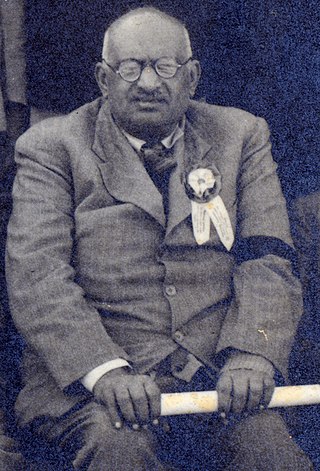
The Radcliffe Line was the boundary demarcated by the two boundary commissions for the provinces of Punjab and Bengal during the Partition of India. It is named after Cyril Radcliffe, who, as the joint chairman of the two boundary commissions, had the ultimate responsibility to equitably divide 175,000 square miles (450,000 km2) of territory with 88 million people.

Tara Singh was a Sikh political and religious figure in India in the first half of the 20th century. He was instrumental in organising the Shiromani Gurdwara Prabhandak Committee and guiding the Sikhs during the partition of India, which he strongly opposed.

Jogendranath Mandal emerged as a prominent figure among the architects of the nascent state of Pakistan. He served as the inaugural Minister of Law and Labour, as well as the subsequent Minister of Commonwealth and Kashmir Affairs. Within the Interim Government of India, he had previously held the portfolio of law. Distinguished as a leader representing the Scheduled Castes (Dalits), Mandal vehemently opposed the partition of Bengal in 1947. His rationale rested on the apprehension that a divided Bengal would subject the Dalits to the dominance of the majority caste-Hindus in West Bengal (India) and Assam. Eventually opting to maintain his base in East Pakistan, Mandal aspired for the welfare of the Dalits and assumed a ministerial role in Pakistan as the Minister of Law and Labour. However, a few years subsequent to the partition, he relocated to India, tendering his resignation to Liaquat Ali Khan, the then Prime Minister of Pakistan, citing the perceived anti-Dalit bias within the Pakistani administration.
Nawab Khwaja Habibullah Bahadur was a Bengali politician, soldier, social worker, and the fifth Nawab of Dhaka. He was the son of Nawab Sir Khwaja Salimullah Bahadur. Under Habibullah's rule, the Dhaka Nawab Estate went into decline until its actual relinquishment in 1952 by the East Pakistan Estates Acquisition Act.
Mushirul Hasan was a historian of modern India. He wrote on the partition of India, communalism, and on the history of Islam in South Asia.
Subrata Kumar Mitra was director and research professor at the Institute for South Asian Studies at the National University of Singapore till May 20, 2018. Currently emeritus at the University of Heidelberg.

The Jama Mosque is a 17th-century congregational mosque located in the historic core of Agra, Uttar Pradesh. It was built by Jahanara Begum, the eldest daughter of Mughal Emperor Shah Jahan, during the latter's reign. It is the principal mosque in the city of Agra, and lies close to Agra Fort.

C. Rajagopalachari's formula was a proposal formulated by Chakravarti Rajagopalachari to solve the political deadlock between the All India Muslim League and the Indian National Congress on the independence of British India. The League's position was that the Muslims and Hindus of British India were of two separate nations and henceforth the Muslims had the right to their own nation. The Congress, which had predominantly Hindu members and opposed to the idea of partitioning the Subcontinent. With the advent of the Second World War the British administration sought to divide the Indian political elite into two factions so as to make sure that the Indian independence movement does not make large progress, taking advantage of the war.
Krishna Kumar is an Indian intellectual and academician, noted for his writings on the sociology and history of education. His academic oeuvre has drawn on multiple sources, including the school curriculum as a means of social inquiry. His work is also notable for its critical engagement with modernity in a colonized society. His writings explore the patterns of conflict and interaction between forces of the vernacular and the state. As a teacher and bilingual writer, he has developed an aesthetic of pedagogy and knowledge that aspires to mitigate aggression and violence. In addition to his academic work, he writes essays and short stories in Hindi, and has also written for children. He has taught at the Central Institute of Education, University of Delhi, from 1981 to 2016. He was also the Dean and Head of the institution. From 2004 to 2010, he was Director of the National Council of Educational Research and Training (NCERT), an apex organization for curricular reforms in India. He was awarded the Padma Shri by the President of India in 2011.

Western Uttar Pradesh is a region in India that comprises the western districts of Uttar Pradesh state, including the areas of Rohilkhand and those where Hindi and Braj are spoken. The region has some demographic, economic and cultural patterns that are distinct from other parts of Uttar Pradesh, and more closely resemble those of Haryana and Rajasthan states. The largest city of the region is Ghaziabad, while the second-largest city, Agra, is a major tourist destination.

Tan Tai Yong is a Singaporean academic who is the current President of Singapore University of Social Sciences. He served as the President of Yale-NUS College from 2017 to 2022. He is also Chairman of the Management Board of the Institute of South Asian Studies, an autonomous university-level research institute in NUS. He was a former Nominated Member of Parliament and served from 2014 to 2015.
The New Bengal Association was founded by Atulya Ghosh, Dhirendranath Mukherji, Jadabendranath Panja, Nalinaksha Sanyal and Sukumar Dutta to press for the Partition of Bengal to create West Bengal as a homeland of the Bengali Hindu people. It along with the Bengal Provincial Hindu Mahasabha and the Indian Association submitted a joint memorandum before the Bengal Boundary Commission for the inclusion of Hindu-majority territories in West Bengal. After the Partition, it campaigned for the inclusion of Bengali-speaking areas of Bihar for their incorporation into West Bengal.

The history of Uttar Pradesh, a state in India, stretches back several millennia. The region shows the presence of human habitation dating back to between 85,000 and 73,000 years ago. Additionally, the region seems to have been domesticated as early as 6,000 BC.

The Shiromani Akali Dal (SAD) is a centre-right Sikh-centric state political party in Punjab, India. The party is the second-oldest in India, after Congress, being founded in 1920. Although there are many parties with the description Akali Dal, the party that is recognized as "Shiromani Akali Dal" by the Election Commission of India is the one led by Sukhbir Singh Badal. The party has a moderate Punjabi agenda. On 26 September 2020, they left the NDA over the farm bills.

Ranjit Sitaram Pandit was an Indian barrister, politician, author and scholar from Rajkot in the Kathiawar region of British India. He is known for his role in the Indian non-cooperation movement, and for translating the Sanskrit texts Mudrarakshasa, Ṛtusaṃhāra and Kalhana's Rajatarangini into English.

Bareilly Cantonment is a cantonment town located in the Bareilly district of the north Indian state of Uttar Pradesh.
Bedian, also spelled Badian, is a village in the Kasur District of Punjab, Pakistan, close to the India-Pakistan border. The village was founded by the Sikh preacher Baba Sahib Singh Bedi during the reign of Maharaja Ranjit Singh. After the partition of India, Pakistan built the Bambawali-Ravi-Bedian Canal, bringing waters from the Chenab River to the Upper Bari Doab Canal, as a replacement for the canal waters lost to the Indian Punjab.

Partition Horrors Remembrance Day is an annual national memorial day observed on 14 August in India, commemorating the victims and sufferings of people during the 1947 partition of India. It was first observed in 2021, after announcement by Prime Minister Narendra Modi.

Muhajir History or History of Muhajirs refers to the history and origins of the Muhajir people in Pakistan. Most Muhajirs migrated from what is now Uttar Pradesh, Telangana, Rajasthan, Bihar, Gujarat, and West Bengal, and that results in close ties between the ethnic groups and histories.

Bihari Lal Rallia Ram was an anti-colonial politician associated with the Indian National Congress and the founding secretary of All India Conference of Indian Christians. After partition, Ram stayed in Pakistan and launched the All Pakistan Christian League. In April 1950, he was inducted as a representative of Punjab in the Constituent Assembly of Pakistan.












